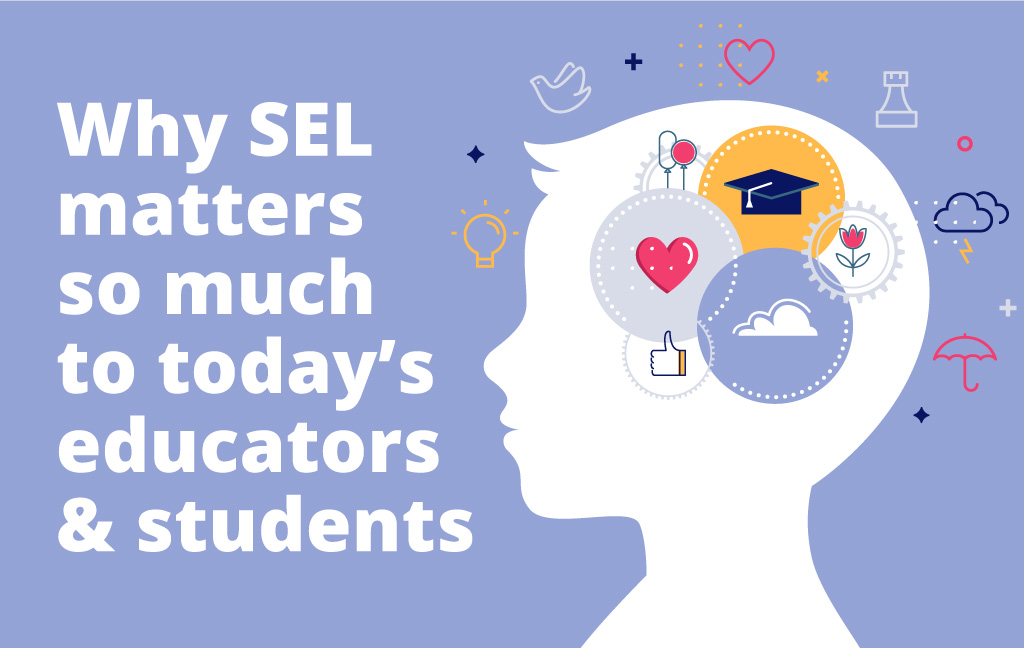Part 1 of a 2-Part Blog
A Q&A on the importance of social- & emotional-focused education
School shootings, a global pandemic, civil unrest and cyber bullying are just some of the myriad of issues facing today’s K-12 students. Add in the “normal” challenges of just being a kid, and it’s clear that educators serve a vital role in the social and emotional well-being of their students.
In a 2022 report, the National Center for Education Statistics released data that found 70% of public schools reported “an increase in the percentage of their students seeking mental health services at school since the start of the COVID-19 pandemic, and roughly three-quarters (76%) of schools also reported an increase in staff voicing concerns about their students exhibiting symptoms such as depression, anxiety, and trauma.” The good news, however, is that roughly half of public schools report that they can effectively provide mental health services to all students in need,” according to the NCES study.
With the official end of the pandemic expected later this year, its residual impact along with other societal issues continue to affect U.S. youth. As trusted leaders in K-12 online learning, the Virtual Learning Leadership Alliance embraces the critical role of social and emotional learning (SEL). VLLA members are spearheading SEL initiatives, incorporating best practices into their curricula for the overall health and wellbeing of students.
VLLA recently sat down with Junell “Nellie” Christian, director of ACCESS Virtual Learning and a VLLA member, to gain insights into SEL and its importance for online educators and, especially, for those they teach.
Why is SEL important for today’s K-12 student?
It sounds cliche, but learning is so much more than academic. As educators, we want students to learn to be reflective, lifelong learners who are critical and innovative thinkers. To evaluate, synthesize, and analyze academic content requires an understanding of how we are each reacting to any content in the context of the individual and the community perspective.
For a K-12 student, the messages that society sends are often confusing, subjective, emotional, and in need of perspective. A well-rounded individual is the one who can understand that perspectives can be different between two individuals, but respect can maintain the highest levels.
Teaching and learning along the K-12 continuum is filled with many opportunities for students to interject their opinions, thoughts, and feelings and develop perspective. Students process facts, interpret these facts through their developmental lens, and offer outcomes that should demonstrate growth. However, what is growth? It is academic, social, and emotional, and often transcends much of what traditional testing can measure. SEL, then, must be part of the teaching and learning process.
What are some best practices for SEL especially for online learners?
Life is about relationships. Even in the online space, we have to figure out how to develop and maintain relationships with students. This is not an easy task.
I think the best practice is to be flexible and adaptable. SEL will never be a stagnant concept. As soon as we figure out the best way to connect with a student, the need for and degree of connection changes, and often because of circumstances well beyond the classroom and teacher’s control.
I do think we have to be careful not to silo SEL. To be effective, it has to be a part of a whole meaning while educators can teach explicit SEL instruction, the value for the student is evident when they understand that concepts like self-awareness, healthy relationships, self-management, responsible decision-making, and social awareness (CASEL) are not just practices learned in one activity period a day but rather secondary and tertiary concepts taught in tandem with core content and electives. SEL concepts will be most effective when they are interwoven into everyday life to include teaching, learning, and life outside of school.
As referenced by Christian, student growth has as much to do with academics as it does with the child’s overall growth and development. As always, educators will continue to provide a strong foundation of support for overall success.


